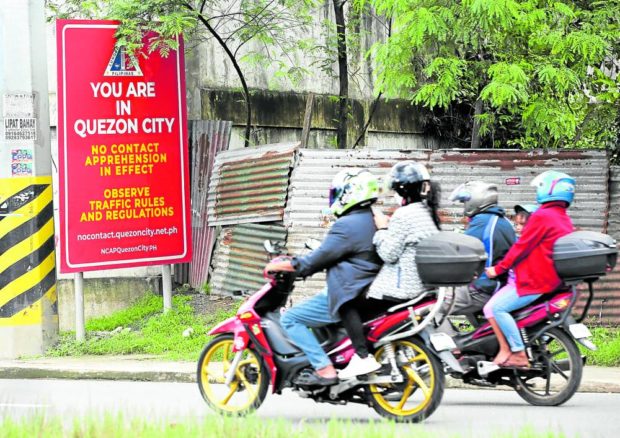
NO PULLING OVER, ONLY CITATION | In this photo taken last Thursday, motorists entering Quezon City are notified by a sign indicating that the no-contact apprehension policy is in effect. The city government on Tuesday, Aug. 30, 2022, said it “fully respects” the Supreme Court’s restraining order. (Photo by LYN RILLON / Philippine Daily Inquirer)
MANILA, Philippines — The Supreme Court has ordered the Land Transportation Office (LTO), the Metropolitan Manila Development Authority (MMDA), and five Metro Manila cities to stop implementing the no-contact apprehension policy (NCAP) for motorists “until further orders.”
The temporary restraining order (TRO) is “effective immediately,” the high court said, adding that it will hear in open court on Jan. 24 next year the two legal challenges to that policy on monitoring traffic violations via closed-circuit television (CCTV) cameras.
“The court resolved, without necessarily giving due course to the petitions, to issue a temporary restraining order effective immediately, enjoining all respondents from the implementation of the no-contact apprehension policy (NCAP) programs and related ordinances,” the Supreme Court’s Public Information Office said in a statement on Tuesday, following the tribunal’s weekly full-court session.
“The court also said that any apprehensions through the NCAP programs and related ordinances shall be prohibited until further orders from the court,” the statement also said.
The high court also stopped the LTO and “all parties acting on its behalf from giving out motorist information to all local government units, cities and municipalities enforcing NCAP programs and ordinances.”
Aside from the LTO and the MMDA, the restraining order was also addressed to the city governments of Manila, Quezon City, Valenzuela, Parañaque and Muntinlupa—where the no-contact policy had been implemented.
‘Constant threat’
Two petitions questioning the traffic policy were filed this month by transport groups and by a lawyer who claimed his rights were violated on being cited for traffic violations.
In their petition filed on Aug. 3, transport groups Kilusan sa Pagbabago ng Industriya ng Transportasyon Inc., Pasang Masda, Alliance of Transport Operators and Drivers Association of the Philippines and Alliance of Concerned Transport Organizations said the NCAP places motorists “under the constant threat of being arbitrarily apprehended remotely.”
They argued that the city ordinances implementing the policy are invalid since Congress has not amended Republic Act No. 4136 or the Land Transportation and Traffic Code, the 1964 law creating the LTO.
According to the petitioners, that law allows only face-to-face apprehension of traffic violators and places such liability on erring drivers, not the registered vehicle owners.
The transport groups also cited what they called “unreasonable” penalties under the NCAP, including nonrenewal of vehicle registration until traffic fines are paid.
Due process, data privacy
In his petition dated Aug. 18, lawyer Juman Paa said his right to due process was violated since he had not been notified about his four supposed traffic violations in Manila—for which, he said, he had to pay more than P20,000 in penalties just so he could renew his vehicle registration.
Paa also argued that the right to data privacy was compromised by the implementation of the NCAP, since traffic violation records and personal details of motorists in the website of the Manila government, in particular, were accessible to anyone who simply typed in the plate number of the vehicle involved in the violation.
Reached for comment, Crisanto Saruca Jr., director of the MMDA’s Traffic Discipline Office, said his agency “will comply if we are covered by the TRO.”
In a statement, LTO chief Teofilo Guadiz III said his office “together with the LGUs (local government units), transport groups, and other concerned stakeholders will have more time to sit down and discuss issues related to the policy.”
“One of the LTO’s main concerns from the very start regarding the NCAP was on the issue of data privacy and compliance [with] the country’s data privacy laws… We take the issue of data privacy seriously since it concerns motorists’ information. [T]hat is why coming up with appropriate guidelines on this matter… is very important,” Guadiz added.
Defending NCAP
The local government of Quezon City said it “fully respects” the Supreme Court’s order.
But it also pointed out that the NCAP helped reduce traffic violations in Quezon City by 93 percent and “instill… a culture of traffic discipline among motorists. [Thus] we believe that its implementation is legal and proper.”
Princess Abante, Manila’s communications chief, said the city government “would abide by [the] TRO as soon as we receive it.”
Nevertheless she also defended the controversial traffic policy, saying there were fewer traffic violations and accidents and “thousands of beneficiaries of an orderly and fast traffic every day [after] more than three years of NCAP implementation in Manila.”
“The leadership of the City of Manila believes that the correct use of modern technology is the way to provide fast and efficient service to all the citizens,” Abante said in her statement, which was silent on Paa’s petition.
—WITH REPORTS FROM DEMPSEY REYES AND JANE BAUTISTA
RELATED STORIES
2 solons welcome TRO on NCAP as it allows for more talks
Lawyer files SC petition vs no-contact citations